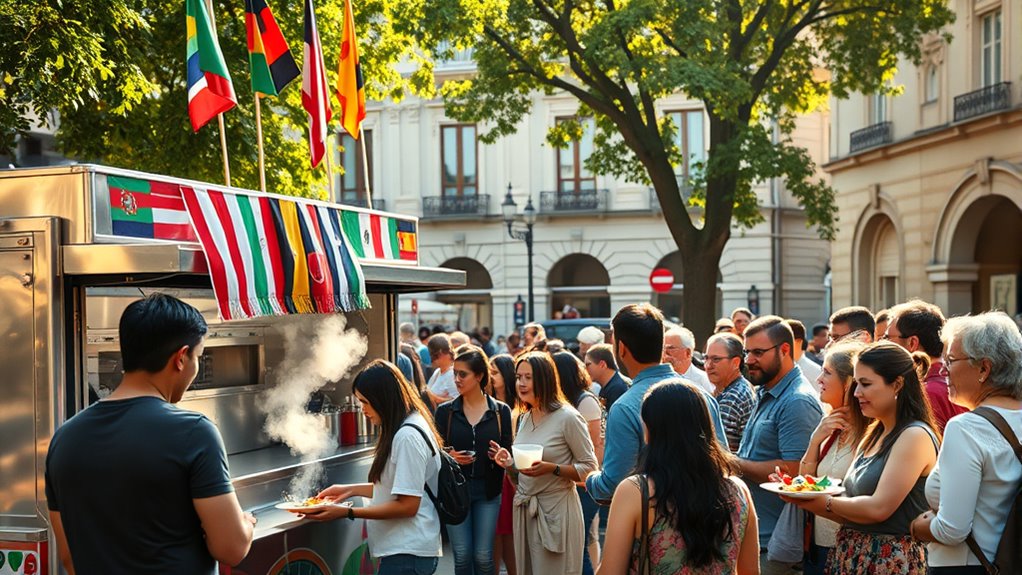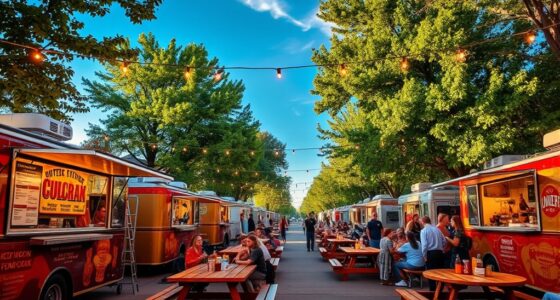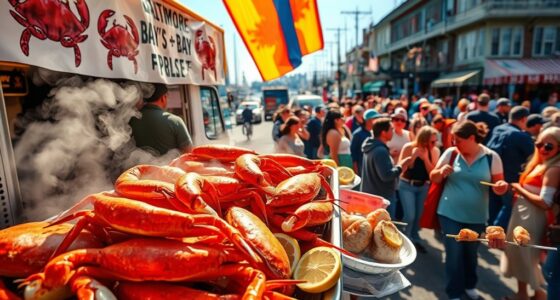To plan international food truck trips, start by researching local regulations, permits, and health standards to stay compliant. Understand cultural preferences to tailor your menu and engagement strategies for each market. Plan logistics carefully by mapping routes and securing permits, while managing your budget for permits, transportation, and marketing. Building local partnerships with vendors and community groups can boost your success. Continue exploring these areas to smoothly navigate international markets and turn your plans into thriving ventures.
Key Takeaways
- Research and comply with each country’s food safety, licensing, and zoning regulations before operation.
- Understand local cuisine, cultural sensitivities, and community preferences to tailor menus and branding effectively.
- Map out transportation routes, parking options, and location strategies to optimize visibility and operational efficiency.
- Budget for permits, transportation, regional ingredients, and marketing, while building partnerships with local vendors and businesses.
- Engage with communities through events and feedback, fostering trust and adapting offerings to regional tastes.
Researching Destination Regulations and Permits
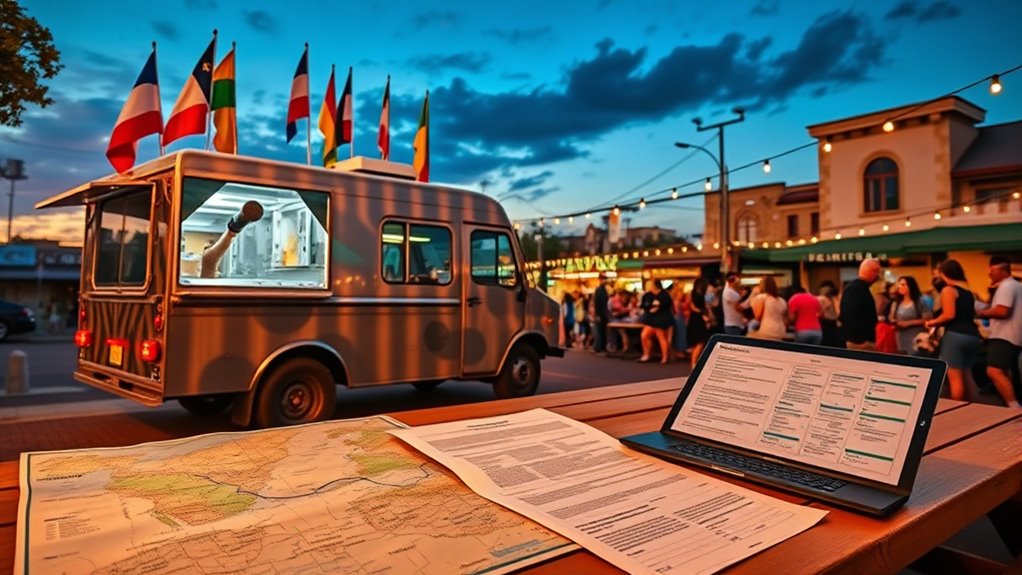
Have you checked the specific regulations and permit requirements for each destination country? This step is vital to guarantee your food truck operation stays compliant with local laws. Understanding food safety standards helps prevent health violations and protects your reputation. Legal compliance isn’t just about permits; it includes vehicle registration, zoning, and health inspections. Different countries have unique rules, so research thoroughly before you go. Contact local authorities or agencies to clarify licensing procedures and any restrictions on food handling or sales. Missing these details can lead to fines or shutdowns, disrupting your trip plans. Additionally, understanding water safety standards in your destination ensures your operations meet health regulations and keep customers safe. Familiarizing yourself with industry trends can also give you an advantage in adapting your menu and services to local preferences. Being aware of unique regulations related to food trucks in each location can help you avoid unexpected legal hurdles. It’s also helpful to review permit renewal processes to ensure continuous compliance throughout your trip. Cultivating a curious mindset about local legal landscapes can help you stay proactive in navigating regulatory changes. By prioritizing destination regulations and permits, you set a solid foundation for a smooth, compliant, and successful international food truck adventure.
Understanding Local Tastes and Cultural Preferences

After securing the necessary permits and understanding destination regulations, it’s time to focus on what will truly resonate with your audience: local tastes and cultural preferences. Familiarize yourself with the local cuisine, ingredients, and flavor profiles to craft authentic dishes. Respect cultural sensitivities by avoiding ingredients or presentation styles that might offend. Visualize the vibrant food scene: Active listening and understanding local preferences can help you better connect with your customers’ desires. Recognizing the importance of attention in creative practice, paying close attention to local customs and nuances enhances your ability to offer culturally respectful and appealing food options. Incorporating cultural awareness into your menu design and presentation can further demonstrate respect and authenticity to your audience. Additionally, understanding local food safety standards is crucial for ensuring quality and compliance.
Logistics Planning and Transportation Strategies

Effective logistics planning and transportation strategies are essential to guarantee your food truck reaches each destination smoothly and on time. Start by mapping out your routes carefully, considering local traffic, road regulations, and parking options. Incorporate menu customization to adapt offerings based on regional preferences, making your truck more appealing. Efficient scheduling ensures you’re prepared for setup and breakdown, reducing delays. Use marketing strategies to promote your presence in new locations, attracting more customers. Make certain your vehicle is well-maintained to prevent breakdowns. Coordinate with local authorities for permits and parking permissions ahead of time. Staying organized and flexible in your logistics allows you to navigate challenges and deliver a seamless experience for your customers at every stop. Additionally, understanding transportation strategies can help optimize delivery times and reduce fuel costs. Regular vehicle maintenance and cold-pressed vegetable juice preparation techniques can also play a role in keeping your operations running smoothly and healthily. Paying attention to toilet maintenance and repairs during your planning can prevent unexpected delays, especially in unfamiliar locations. Incorporating necessary cookies in your planning process ensures that essential site functionalities or booking systems operate without interruption. Planning for real-time traffic updates can further enhance route efficiency and avoid unexpected congestion.
Budgeting and Financial Considerations
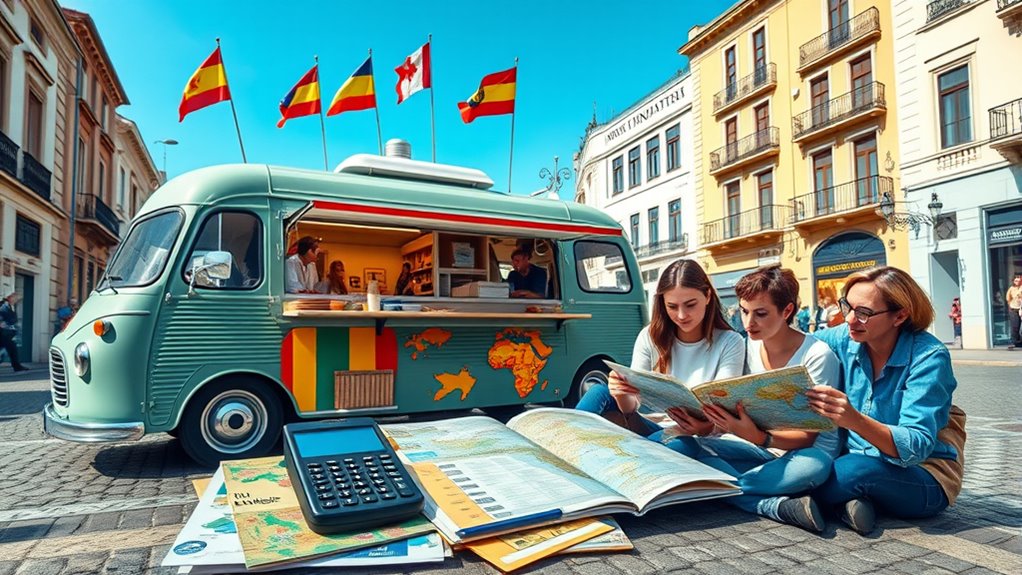
Budgeting and financial considerations are essential to guaranteeing your international food truck trip remains profitable and sustainable. You need to carefully estimate costs like permits, transportation, and local taxes. Consider how menu customization can influence expenses—unique ingredients or regional specialties might increase costs but attract more customers. Developing effective marketing strategies is equally crucial; allocate funds for local advertising, social media, and promotions to boost visibility and sales. Track your spending closely and set a clear budget to prevent overspending. Additionally, understanding your interest rate on any borrowed funds can help you better plan financing options for your trip. Incorporating cost management strategies can further enhance your ability to stay within budget and ensure long-term success. Being aware of potential payment processing challenges can help you prepare for unforeseen issues and avoid disruptions during your trip. Being familiar with local regulations and their impact on expenses can also help you avoid unexpected fines or compliance costs. By balancing menu innovation with strategic marketing, you can maximize revenue while managing expenses. Remember, a well-planned budget helps you adapt quickly to unforeseen costs and guarantees your trip remains financially viable. Proper financial planning is the foundation of a successful international food truck adventure.
Building Local Partnerships and Networking
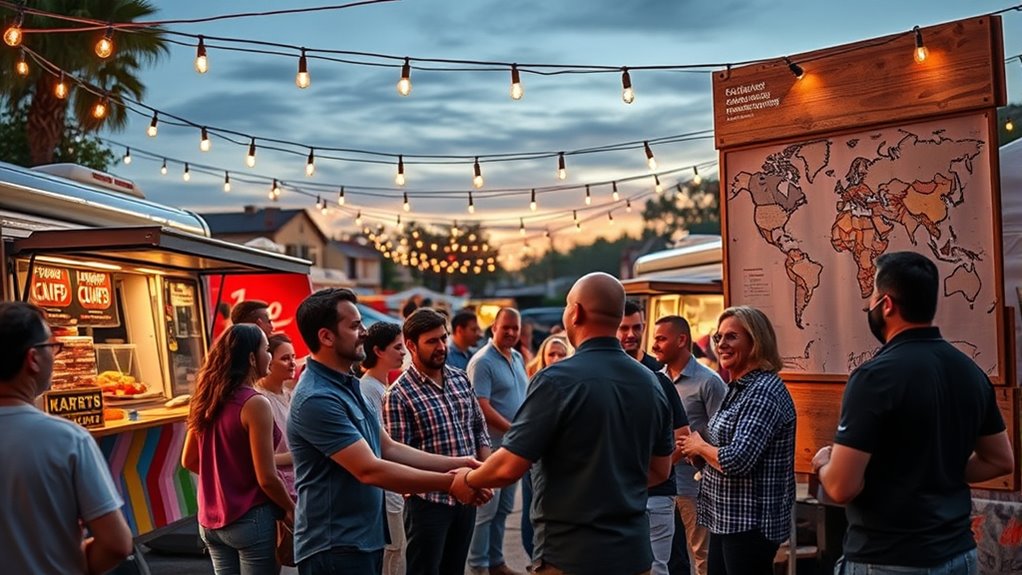
Building strong relationships with local businesses and community leaders can substantially boost your food truck’s success abroad. By engaging with locals and fostering vendor collaborations, you create a supportive network that attracts customers and builds trust. Community engagement helps you understand local tastes and preferences, making your offerings more appealing. Partnering with nearby vendors can lead to cross-promotions and shared resources, increasing your visibility. Use the table below to identify key local partners:
| Potential Partner | Benefits |
|---|---|
| Local cafes | Shared customer base, joint marketing |
| Event organizers | Increased exposure at gatherings |
| Cultural centers | Authentic community engagement |
| Food markets | Higher foot traffic, vendor collaborations |
| Local suppliers | Cost savings, fresh ingredients |
Building these relationships transforms your trip into a community-driven success. Understanding local regulations can help you navigate permits and zoning requirements effectively. Developing a local vendor network can further enhance your presence and operational efficiency in new markets. Additionally, leveraging local community engagement can foster trust and loyalty among residents and visitors alike. Furthermore, implementing predictive modeling can assist in identifying the most promising locations and times for your food truck to operate, optimizing your outreach and sales. Recognizing the importance of cultural insights can help tailor your menu and marketing strategies to resonate with diverse audiences.
Frequently Asked Questions
How Do I Handle Language Barriers During International Food Truck Trips?
When facing language barriers, you should prioritize cultural sensitivity and use simple, clear language. Carry a translation app or phrasebook to bridge communication gaps quickly. Be patient, respectful, and open-minded, recognizing cultural differences. Non-verbal cues like gestures and smiles can also help convey your message. By preparing with language translation tools and maintaining cultural sensitivity, you’ll make interactions smoother and more respectful during your international food truck adventures.
What Insurance Requirements Are Necessary for Cross-Border Food Truck Operations?
When operating your food truck across borders, you need to make certain you have proper insurance coverage. Liability coverage is essential to protect against potential claims, while understanding import regulations helps you stay compliant with local laws. You should verify that your insurance policies include cross-border coverage and meet the specific requirements of each country you’ll visit. Doing this minimizes risks and keeps your international food truck venture smooth and compliant.
How Can I Adapt Menus for Different Dietary Restrictions Abroad?
Your menu must be a chameleon, adapting effortlessly to various dietary restrictions abroad. Focus on menu customization by researching local tastes and common restrictions. Utilize ingredient sourcing to find fresh, allergen-free, or culturally appropriate ingredients. Communicate with local communities or experts to understand dietary needs better. This approach guarantees your food truck appeals universally, turning your menu into a culinary passport that respects and celebrates diverse dietary practices worldwide.
What Are Effective Marketing Strategies for New International Markets?
You can boost your presence in new international markets by leveraging social media to target local audiences effectively. Share engaging content showcasing your food truck’s unique offerings and cultural relevance. Additionally, form local partnerships with community events, vendors, and influencers to build trust and visibility. These strategies help you connect authentically with your audience, increase brand awareness, and generate buzz that drives traffic to your food truck.
How Do I Manage Currency Exchange and Payment Processing Internationally?
Managing currency exchange and payment processing internationally is like juggling flaming torches—you need precision. Use reliable payment gateways that support multiple currencies to streamline transactions. Offer real-time currency conversion to avoid surprises. Always stay updated on exchange rates, and consider setting fixed rates for customers. This approach guarantees smooth payments, builds trust, and keeps your international operations running like a well-oiled machine.
Conclusion
Planning an international food truck trip is like steering through a complex maze, but with thorough research and preparation, you’ll find your way smoothly. Understand regulations, embrace local tastes, and organize logistics carefully. Budget wisely and build strong local connections to enhance your journey. Remember, every step you take is a building block toward success, turning your adventure into a flavorful story worth sharing. With dedication and flexibility, you’ll turn your food truck dreams into a delicious reality.
